See also
- Deloria, a Native American surname derived from Des Laurier
Laurier is the French word for the laurel plant, and is a francophone family name, common in Canada.
Sir Wilfrid Laurier (20 November 1841 – 17 February 1919) was the seventh Prime Minister of Canada from 11 July 1896 to 5 October 1911. As Canada's first francophone prime minister, Laurier is often considered one of the country's greatest statesmen.
Laurier can also refer to:
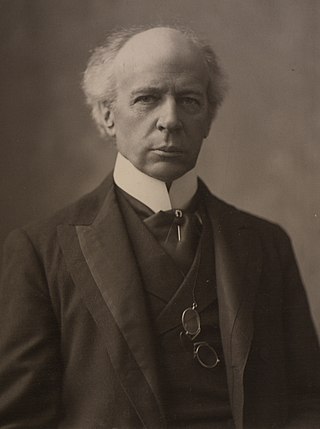
Sir Henri Charles Wilfrid Laurier, was a Canadian lawyer, statesman, and politician who served as the seventh prime minister of Canada from 1896 to 1911. The first French Canadian prime minister, his 15-year tenure remains the longest unbroken term of office among Canadian prime ministers and his nearly 45 years of service in the House of Commons is a record for the House. Laurier is best known for his compromises between English and French Canada.

Outremont is an affluent residential borough (arrondissement) of the city of Montreal, Quebec, Canada. It consists entirely of the former city on the Island of Montreal in southwestern Quebec. The neighbourhood is inhabited largely by Francophones, and is also home to a Hasidic Jewish community. Since the 1950s, Outremont has been mostly residential.

Sir George-Étienne Cartier, 1st Baronet, was a Canadian statesman and Father of Confederation. The English spelling of the name—George, instead of Georges, the usual French spelling—is explained by his having been named in honour of King George III.

Franco-Ontarians are Francophone Canadians that reside in the province of Ontario. Most are French Canadians from Ontario. In 2016, the Government of Ontario calculated that there are approximately 622,415 francophones residing in the province. The majority of Franco-Ontarians in the province reside in Eastern Ontario, Northeastern Ontario, and Central Ontario, although small francophone communities may be found in other regions of the province.

Sir Oliver Mowat was a Canadian lawyer, politician, and Ontario Liberal Party leader. He served for nearly 24 years as the third premier of Ontario. He was the eighth lieutenant governor of Ontario and one of the Fathers of Confederation. He is best known for defending successfully the constitutional rights of the provinces in the face of the centralizing tendency of the national government as represented by his longtime Conservative adversary, John A. Macdonald. This longevity and power was due to his maneuvering to build a political base around Liberals, Catholics, trade unions, and anti-French-Canadian sentiment.

The Manitoba Schools Question was a political crisis in the Canadian province of Manitoba that occurred late in the 19th century, attacking publicly-funded separate schools for Roman Catholics and Protestants. The crisis was precipitated by a series of provincial laws passed between 1890 and 1896, and another passed in 1916.

Events from the year 1896 in Canada.

Events from the year 1886 in Canada.

The 1896 Canadian federal election was held on June 23, 1896, to elect members of the House of Commons of Canada of the 8th Parliament of Canada. Though the Conservative Party, led by Prime Minister Charles Tupper, won a plurality of the popular vote, the Liberal Party, led by Wilfrid Laurier, won the majority of seats to form the next government. The election ended 18 years of Conservative rule.

Rosemère is an affluent suburb of Montreal, in southwestern Quebec, Canada on the north shore of the Rivière des Mille Îles in the Thérèse-De Blainville Regional County Municipality. The town is noted for its green look, due to the high density of trees. Some wooded areas in the town have been left intact as the town has grown around them. Homes are mostly upscale, varying from renovated cottages to unique character homes. It is almost entirely residential, with no significant industries. Boulevard Curé-Labelle, the town's main commercial artery, is lined up by suburban shops and shopping malls, the largest of which is Place Rosemère.
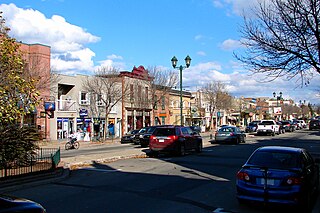
Lachute is a town in southwest Quebec, Canada, 62 km (39 mi) northwest of Montreal, on the Rivière du Nord, a tributary of the Ottawa River, and west of Mirabel International Airport. It is located on Autoroute 50, at the junctions of Quebec Provincial Highways Route 148, Route 158, and Secondary Highways 327 and 329.
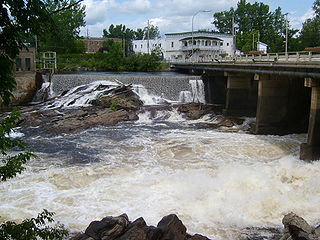
Mont-Laurier is a town and incorporated municipality in northwest Quebec, Canada, located on the banks of the Lièvre River, a tributary of the Ottawa River. Known as the "Capital of the Haute-Laurentides", the motto of the town is Laurus elationis praemium, which translates to "Lift the laurels of reward". The demonym for its inhabitants is Lauriermontois.

Lorraine is an affluent off-island suburb of Montreal, in southwestern Quebec, Canada on the north shore of the Rivière des Mille-Îles in the Thérèse-De Blainville Regional County Municipality. There are no industries and only a very limited commercial district ; almost all houses are of the detached type. Furthermore, a large portion of the town territory is set aside as wild forest ; some bike/ski trails run through it. The town is divided into two areas, Uptown and Downtown. These two areas are also delimited by Quebec freeway A-640, and are only joined together by the main street overpass.

Le Plateau-Mont-Royal is a borough (arrondissement) of the city of Montreal, Quebec, Canada.

Post-Confederation Canada (1867–1914) is history of Canada from the formation of the Dominion to the outbreak of World War I in 1914. Canada had a population of 3.5 million, residing in the large expanse from Cape Breton to just beyond the Great Lakes, usually within a hundred miles or so of the Canada–United States border. One in three Canadians was French, and about 100,000 were aboriginal. It was a rural country composed of small farms. With a population of 115,000, Montreal was the largest city, followed by Toronto and Quebec at about 60,000. Pigs roamed the muddy streets of Ottawa, the small new national capital.
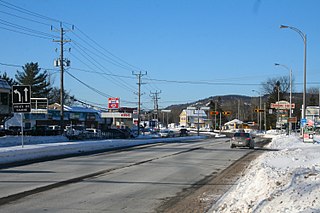
Prévost is a town within the La Rivière-du-Nord Regional County Municipality, Quebec, Canada, and the administrative region of Laurentides in the Laurentian Mountains, north of Montreal. It was created in 1973 from the amalgamation of the former villages of Shawbridge and Lesage with old Prévost on the other side of the Rivière du Nord. Shawbridge was named after William Shaw (1805-1894) who settled in the township of Abercromby in 1847 and built the first bridge over the Rivière du Nord.

Saint-Jean-de-Matha is a municipality located within the Matawinie Regional County Municipality, Quebec, Canada, in the Lanaudière region.

Saint-Roch-de-l'Achigan is a Quebec municipality located in the Montcalm Regional County Municipality located in the Lanaudière region. It is on the banks of the Achigan River, a tributary of the L'Assomption River. According to the town's website, the population is approximately 5,100 and growing steadily as a result of the suburban sprawl in the North Shore of Greater Montreal.

Pointe-Calumet is a municipality in the Canadian province of Quebec. The municipality is located within the Deux-Montagnes Regional County Municipality in the Laurentides region. It is situated about 30 minutes northwest of Montreal. Its population as of the 2006 Canadian Census is just over 6 000.
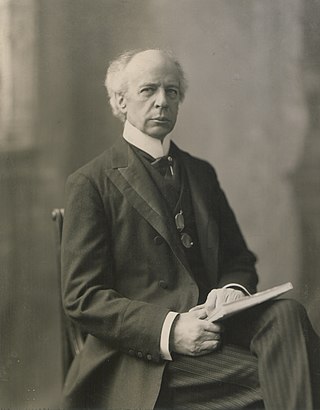
This article is the Electoral history of Sir Wilfrid Laurier, the seventh Prime Minister of Canada.